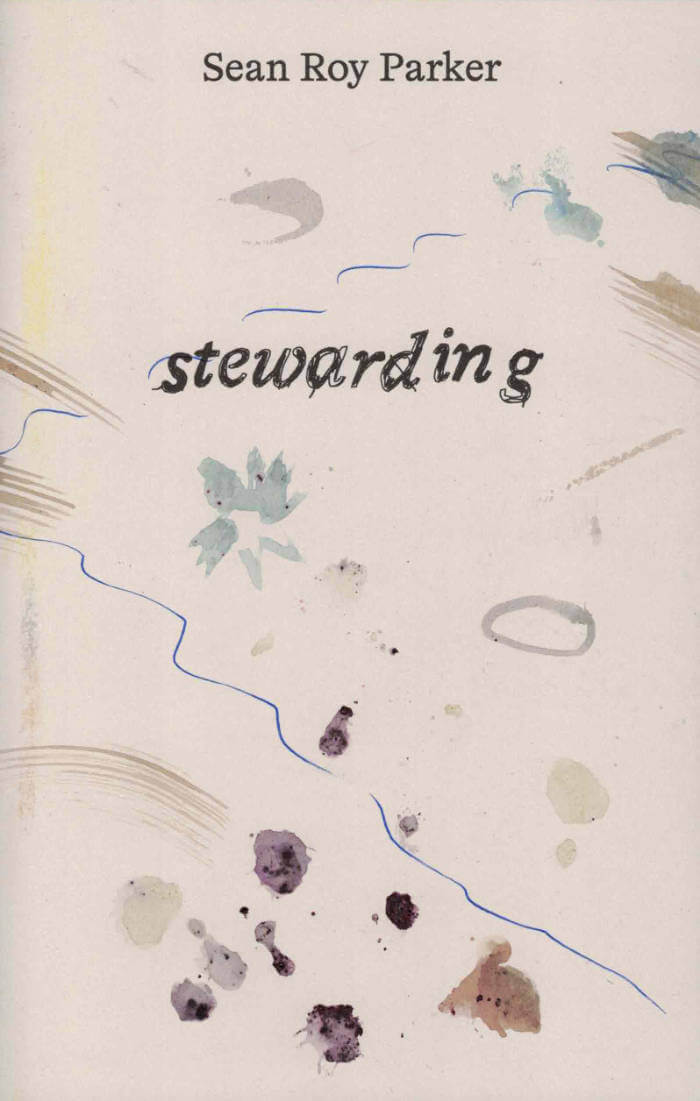
Amends
Amends by Tim Etchells is a selection of texts haunted by performance but written for the page. In three uncanny acts, Amends exhausts the inauthentic languages of device, correction and apology, while remaining deeply sorry.

Amends by Tim Etchells is a selection of texts haunted by performance but written for the page. In three uncanny acts, Amends exhausts the inauthentic languages of device, correction and apology, while remaining deeply sorry.

stewarding maps the joyful and embodied ways we can resist oppressive structures that control our food, housing, and socialisation. We begin in an abandoned school, previously the union headquarters for a coal board, which became a legal guardianship, now condemned. We witness acts of communing between human inhabitants, composting worms, microbes in fermentation, and learn working class histories along the way. Here, complex networks emerge between agents, and thrive, disrupting the monolithic power of corporate extraction. Sean Roy Parker’s debut collection of poetry is a generous account of hopeful ways to eat and ways to live.

A collection of brief descriptions of Toine's movement performances- and installations since 1979. The book, that started four years ago as a possible form in which Toine's ephemeral works could live on, gradually developed into a writing project about movement and the imaginative power of language.
Each of the 120 selected works has been translated in the most concise way into words and sentences.
Because of the possible role that the book could play in the discussion about conserving and documenting volatile works of art, Toine included related texts by other writers who directly or indirectly responded to my writing: Marcus Bergner Hannes Böhringer Florian Cramer Jan Van Den Dobbelsteen Nell Donkers Tim Etchells Ger Groot Geert Koevoets Thomas Körtvelyessy Dom H. van der Laan Dick Raaijmakers Jan Laurens Siesling Sandra Smets Hans Stevens ieke Trinks Samuel Vriezen Ciel Werts - Emilie Gallier
Editing and text advice Kathrin Wolkowicz Dick van Teylingen
translations: Simon Benson Maaike Trimbach Samuel Vriezen Helen Adkins Vincent W.J. van Gerven Oei
graphic design: Koos Siep
Edition: 2 x 250 copies

Edited by Astrid Kaminski, Jeroen Versteele, Julie De Meester. A personal and intimate look behind the scenes of Meg Stuart's creative process over more than a decade.
Since the early nineties, Meg Stuart, and her dance company Damaged Goods, based in Brussels, have produced a remarkable and audacious body of choreographic work. In 2010, Damaged Goods published Are we here yet?, which spans the first twenty years of Meg Stuart's career. In the follow-up book Let's not get used to this place, the choreographer looks back on more than a decade of works through reflections, interviews, scores, and notes on the practice of creating, performing, teaching and living dance. These are mixed with reports, essays and poetry by collaborators and other observers, photos, performance texts and archive material. The book's title, gleaned from one of Stuart's recent video works, ties together these multifarious sources in a desire to discard tried and tested strategies, explore new contexts, and transgress the edge of what we (do not) know.
Let's not get used to this place gives a sense of the plentitude of motions, inspirations and personalities that energize Meg Stuart's creative cosmos. It offers a personal and intimate look behind the scenes of the creative process, and expands this to include the world around it. As a journey through her more recent career, an inspiring manual and a work of art in its own right, it has a wide appeal to an international base of artists, students and peers, and to anyone who is interested in performance.
Contributions by Jean-Marc Adolphe, Preethi Athreya, Mariana Tengner Barros, Sandra Blatterer, Esther Boldt, Márcio Kerber Canabarro, Varinia Canto Vila, Descha Daemgen, Jorge De Hoyos, Igor Dobricic, Brendan Dougherty, Doris Dziersk, Tim Etchells, Moriah Evans, Thomas F. DeFrantz, Jule Flierl, Alain Franco, Davis Freeman, Ami Garmon, Philipp Gehmacher, Jared Gradinger, Ezra Green, Claudia Hill, Maija Hirvanen, Elise Misao Hunchuck, Astrid Kaminski, Kiraṇ Kumār, Göksu Kunak, André Lepecki & Eleonora Fabiano, Jean-Paul Lespagnard, Marc Lohr, Matthias Mohr, Anne-Françoise Moyson, Anja Müller, Kotomi Nishiwaki, Jeroen Peeters, Alejandro Penagos, Léa Poiré, Leyla Postalcıoğlu, Ana Rocha, Tian Rotteveel, Hahn Rowe, Isabela Fernandes Santana, Maria F. Scaroni, Bernd M. Scherer, Kerstin Schroth, Gerald Siegmund, Charlotte Simon, Mieko Suzuki, Claire Vivianne Sobottke, Poorna Swami, Meg Stuart, Margarita Tsomou, Kristof Van Boven, Elke Van Campenhout, Myriam Van Imschoot, Jeroen Versteele, Doug Weiss, Stefanie Wenner, Jozef Wouters, John Zwaenepoel.

Constance DeJong’s long-neglected 1977 novel, Modern Love, is one thing made up of many: It is science fiction. It is a detective story. It is a historical episode in the time of the Armada and the dislocation of Sephardic Jews from Spain to an eventual location in New York’s Lower East Side. It is a first-person narrator’s story; Charlotte’s story; and Roderigo’s; and Fifi Corday’s. It is a 150-year-old story about Oregon and the story of a house in Oregon. Modern Love’s continuity is made of flow and motion; like an experience, it accumulates as you read, at that moment, through successive moments, right to the end.
An important figure of downtown New York’s performance art and burgeoning media art scene in the late 1970s and early 1980s, DeJong designed Modern Love herself and published it with help from Dorothea Tanning on the short-lived Standard Editions imprint. Critically acclaimed in its time, Modern Love is now back in print on the 40th anniversary of its original publication.
Constance DeJong is an artist and writer who has worked for thirty years on narrative form within the context of avant-garde music and contemporary art. Considered one of the progenitors of media art, or “time-based media,” DeJong shapes her intricate narrative form through performances, audio installations, print texts, electronic objects, and video works. Since the 1980s, DeJong has collaborated with Phillip Glass, Tony Oursler, and the Builders Association on performances and videos at Walker Art Museum, Minneapolis, MN; the Wexner Center, Columbus, OH; Philadelphia Museum of Art; and in New York, at The Kitchen, Thread Waxing Space, the Whitney Museum of American Art, and the Dia Center for the Arts. Her books include I.T.I.L.O.E. and SpeakChamber, and her work is included in the anthologies Up is Up, But So is Down: New York’s Downtown Literary Scene, 1974–1991 (NYU Press, 2006); Blasted Allegories (New Museum/MIT, 1987); and Wild History (Tanam Press, 1985).

Forlaget Emancipa(t/ss)ionsfrugten
Signe Frederiksen, Anne-Mette Schultz
Great is the Power of the Name considers the works of authors Elena Ferrante, Pauline Reáge, Karl Ove Knausgård, Colette and artist Lee Lozano.
In 2016, when Anne-Mette had invited Signe to take on the role as editor of her text The Institute of Applied Speech, they both began reading Elena Ferrante's The Neapolitan Novels. They were specifically fascinated by the author’s use of pseudonym. Anne-Mette's Institute of Applied Speech was a tale of a fictive place, a pseudo-topos, and Elena Ferrante’s ideas about the pseudonym as a space for the writing itself was useful in thinking about fictive authorship. In a number of written interviews, Elena Ferrante unfolds the feminist perspective of her use of pseudonym. They were attracted by the idea that the author could avoid the biographical question; that she could disappear behind her own writing.
To them, the artist Lee Lozano is the ghostly presence of hard-core moralist and humorous fuck-off art from another decade. During the course of her life, Lozano continuously reconfigured and gradually dissolved her own name, starting from Leonore Knaster ending up with E. Her work Boycott Women, in which she decides not to have any contact with women, expands the notion of feminist critique.
Great is the Power of the Name publishes a readership interested in the position of the artist, and how it conditions the way we make art.

Dead Minutes is a storytelling game about systemic change in an undesirable afterlife. You, the players, will decide what this hell, underworld or land of the dead is like, what its problems are, how change happens there, and what the complications might be when altering something so big, involving so many dead people, over so much time. It’s a game about impossible seeming actions at impossible seeming scales, making difficult choices, and dealing with unexpected outcomes.
The first half of this book gives you everything you need to play a session of Dead Minutes, which takes 2-5 hours with 3-6 people.
The second half features an essay by Patricia Reed that expands on the concepts of heuristic fictions and vital zombies in relation to the afterlife, and a series of afterlife generating 'seeds' contributed by different types of writers - a demonic boardroom presentation by writer and art critic Habib William Kherbek, a ritual from horror game designer Samuel Clarice Mui Shen Ern, a premise by Arthur C Clarke award winning author Chris Beckett, and a letter from Selma Selman.

13 poems of various length.
"I have used a procedure to write them and I am happy to share it, but it isn't what's most important about these poems. The subject matter that, I eventually realised, they share to the extent of justifying bundling them up in one pamphlet is religiosity, what stands between belief and act, be it faith or trust."

Tiphanie Blanc, Lili Reynaud-Dewar and 1 more
We are not where we need to be but, we ain't where we were is the first volume of a new series of publications by the collective Wages For Wages Against that reports on active research engaged within the artistic professions and institutions since 2017. Its aim is to question the underlying neoliberal logics in the contemporary art world, by orienting our object of study towards the struggles that impact it. With this publication, our hope is to put into practice various values specific to the campaign: the existence of a systematic and fair remuneration, a desire for transparency, the sharing of knowledge, and the visibilization of demands proper to the field of the visual arts and concomitant struggles. It is the result of militant experiences, at the convergence of our individual experiences and collective questionings.
With texts by Tiphanie Blanc, Antonella Corsani, Fanny Lallart, Lili Reynaud-Dewar, Ramaya Tegegne and an interview with Outrage Collectif.